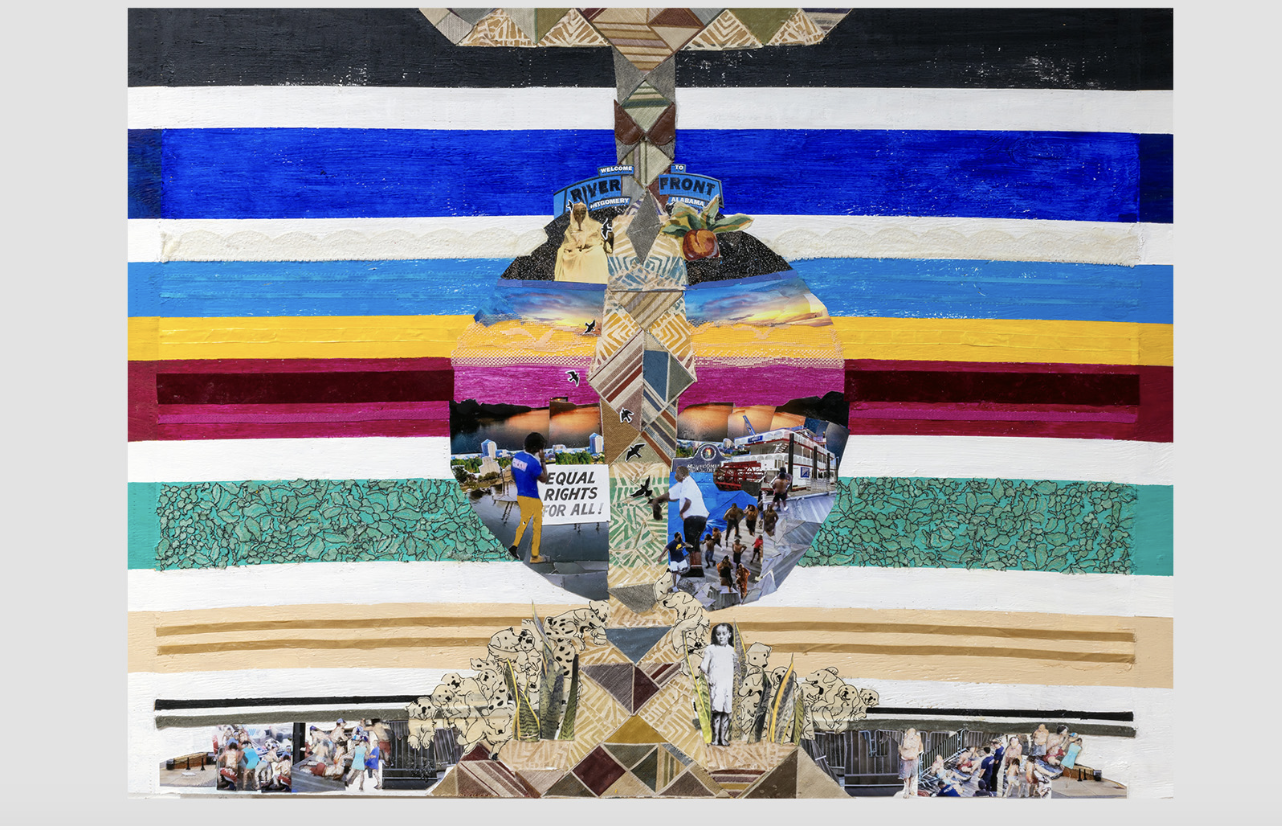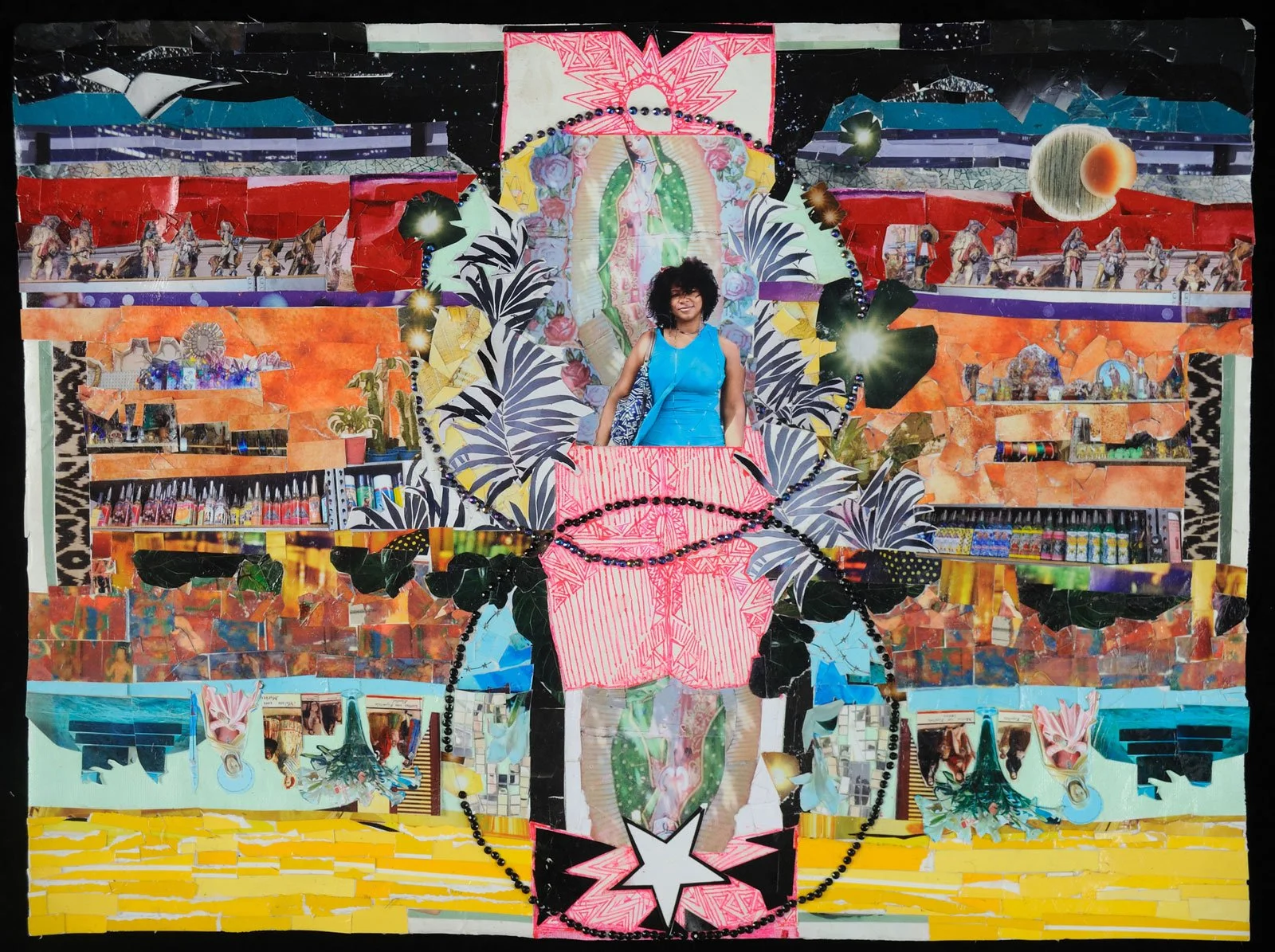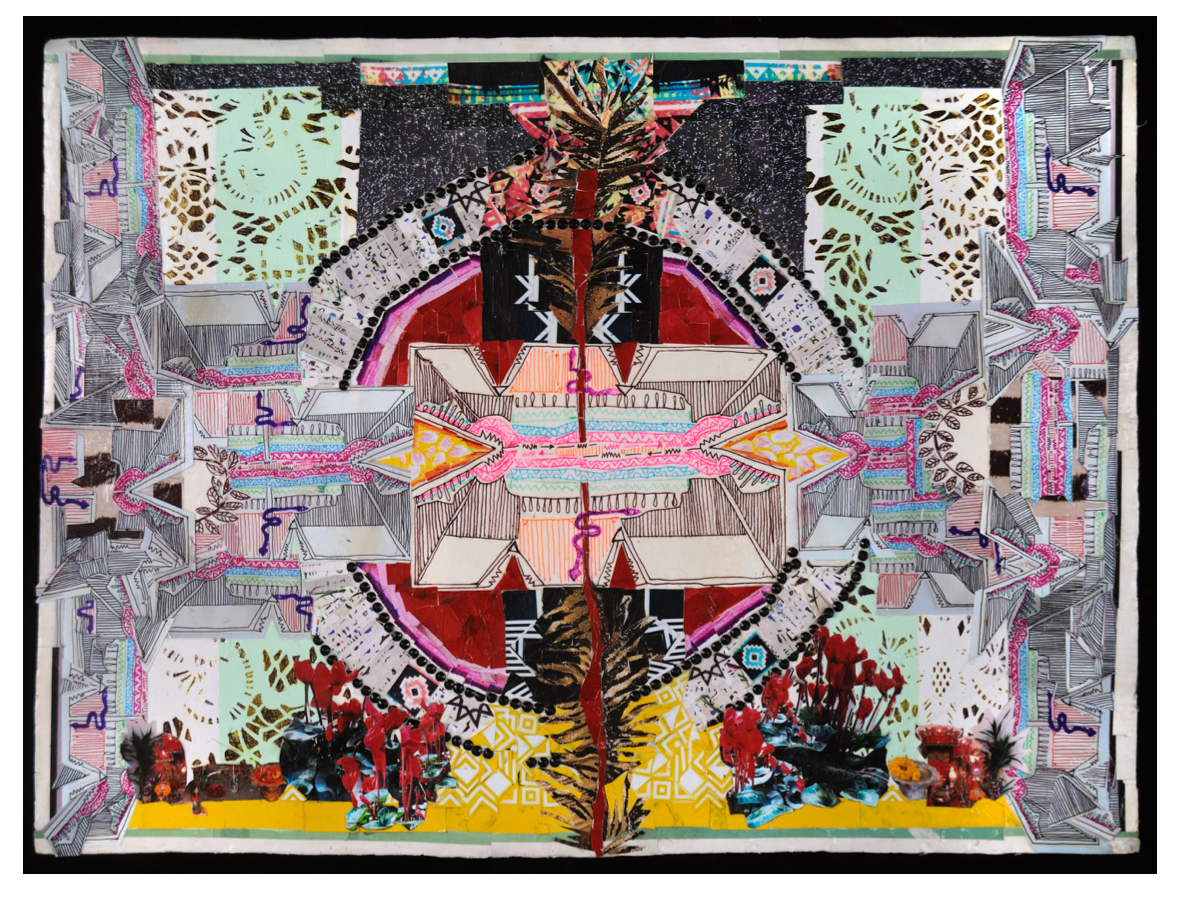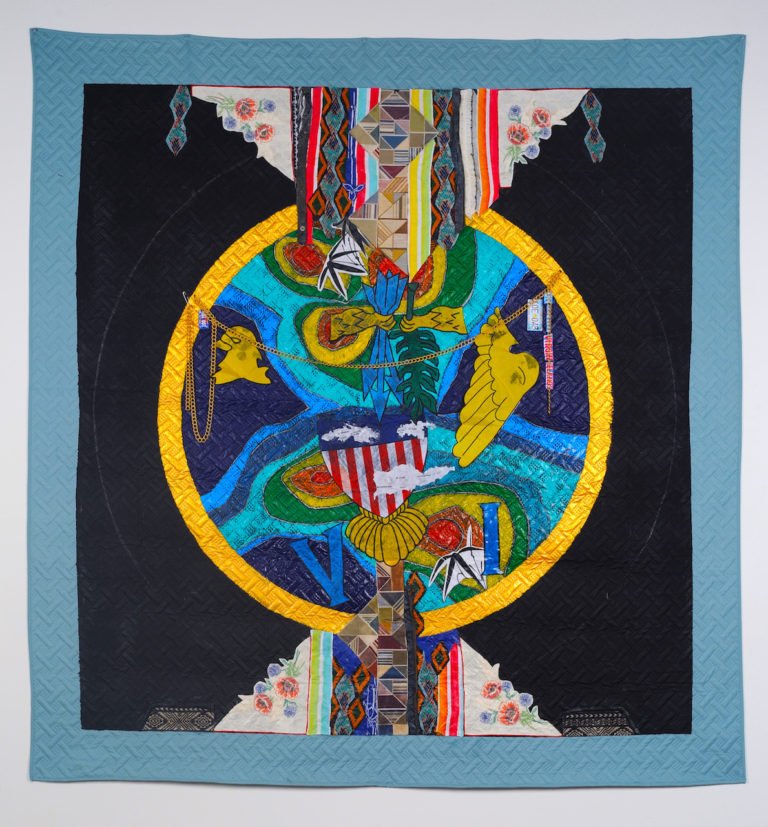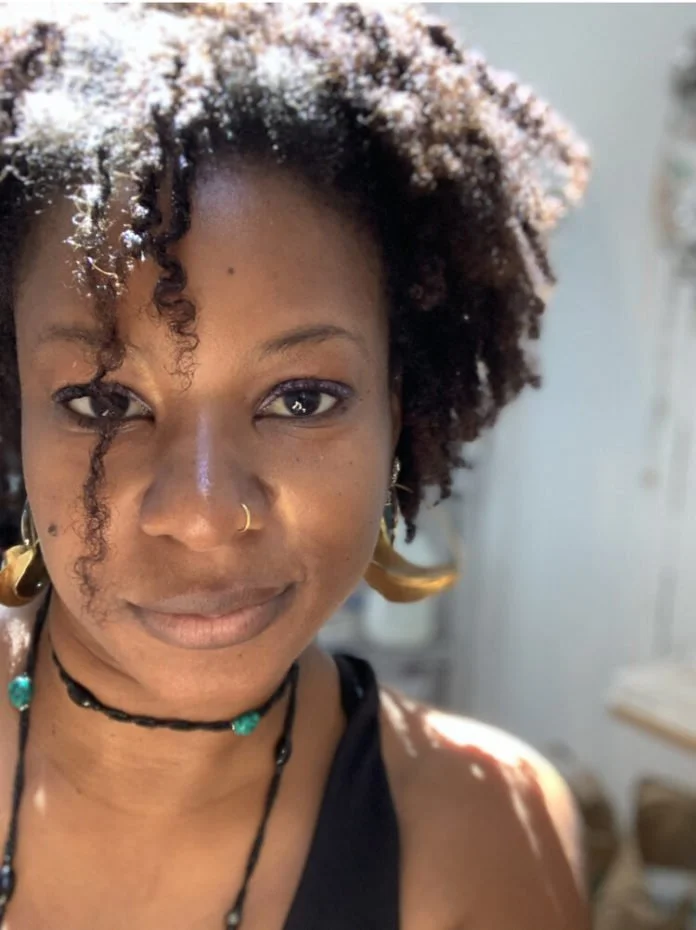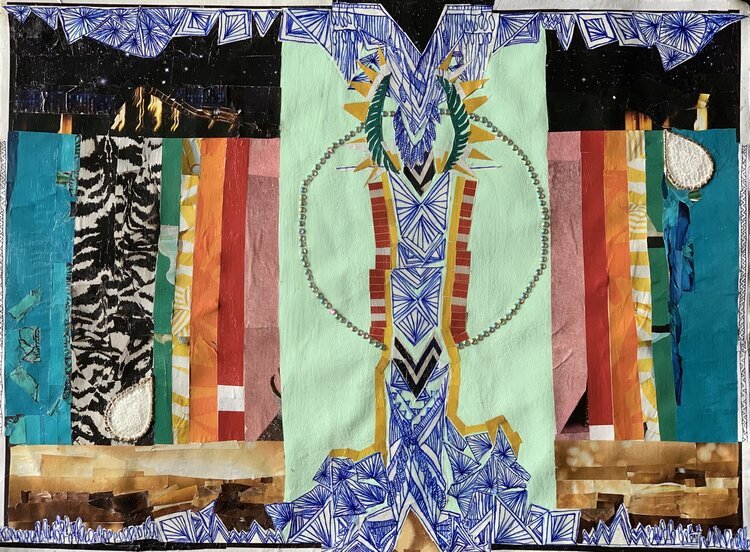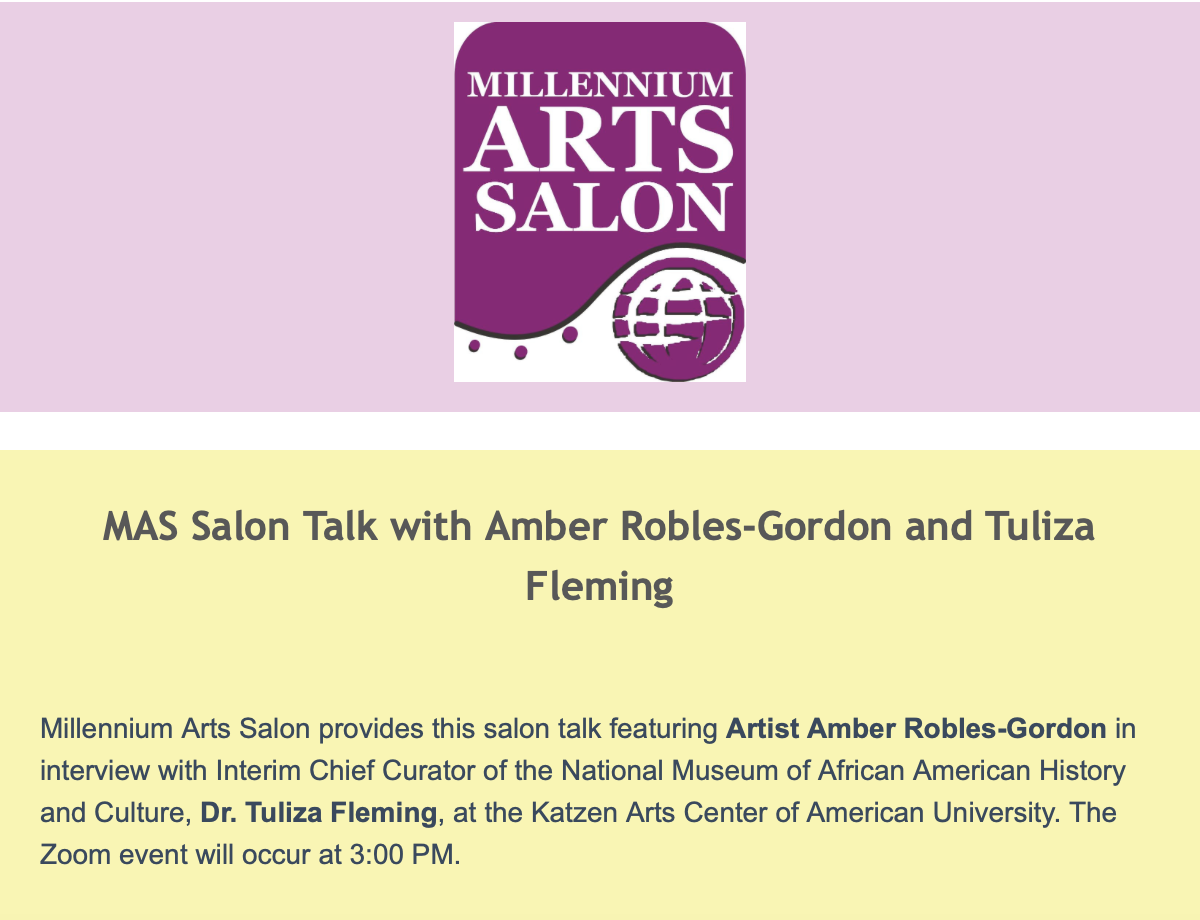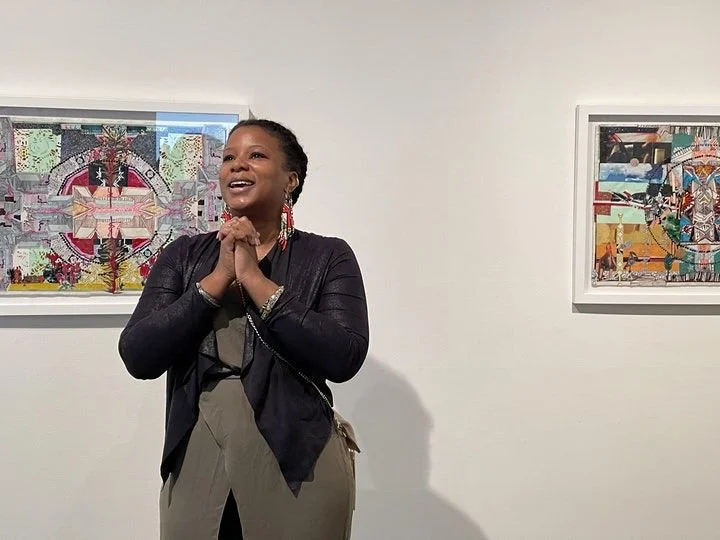Who/what is worthy of care? Who cares for the defenseless? Who/what is defended? Incorporating the transdisciplinary study of human ecology into her practice and scope, Robles-Gordon uses the field as an anchor in her expansive investigations of race, history, the sciences and culture. The resulting new body of work rigorously explores colonialism and imperialism, global anti-blackness, child welfare and animal cruelty. Finding them all connected, just not equally, the exhibition exposes frank contradictions in American perceptions of human life, animal life and minority lives.
Read MoreKatzen Art Center
Amber Robles-Gordon’s anti-colonial quilts and personal histories at American University Museum at the Katzen Center
“y mi bandera vuela mas alto que la tuya,” 2020. Mixed media collage on canvas, 18 x 24 in. Courtesy of the artist.
By Andrea KirshDecember 17, 2021
An artist’s visit to her mother’s birth place in Puerto Rico awakens her to the complexities of immigration and family – and to the dubious socio-political actions and inactions, by the U.S. government in its far-flung territories. Our reviewer Andrea Kirsh is moved by the powerful collage works and double-sided quilts of Amber Robles-Gordon. The show closed Dec. 12.
Amber Robles-Gordon‘s first grade classmates in Arlington, VA bullied her for speaking Spanish, so she learned to speak to her mother in English. It wouldn’t be until middle age that the artist finally visited her mother’s birthplace in Puerto Rico. Successions: Traversing U.S. Colonialism, her solo exhibition at the the American University Museum at the Katzen Center (August 28 – Dec. 12, 2021) in Washington, D.C. was the product of that initial trip and a her return for a six-week residence on the island in 2020.
The exhibition presented two bodies of work. The first, “Place of Breath and Birth” is a series of ten vibrant collages on canvas, all 18 x 24 inches; two, represented by full-scale pigment prints. The collages are constructed from masses of tiny images cut from paper; even the bands of color that form their backgrounds are assembled from minute, colored fragments. And there is a very personal rhythm – like distinctive brushwork – in the way Robles-Gordon arranges the fragments.
Another personal language of Robles-Gordon’s appearing in the fragments is inspired by multiple, non-Western cultural traditions and imagery taken from magazines and photographs. These fragments are used as structuring and framing elements, incorporating the artist’s drawings of detailed and decorative, spiky, geometric patterns. An occasional small trinket or charm adds surface texture, as does the profusion of tiny, sparkly beads which outline the central, circular forms on each collage. The beads and high-keyed colors capture the intense sunlight of the Caribbean and lend a festival-like quality to the series.
Robles-Gordon culls her imagery from photographs she took in Puerto Rico or found elsewhere that evoke its lush, intensely-polychromed environment – both natural and human. While on the island, she was fascinated by the rubber trees and palms, the coconuts and mangos, street murals and public art. The titles of individual collages suggest the range of topics that were prompted by her visits: “Observation of Influencers: Taino culture and heritage, the climate and machismo,” “For bioluminescent bays and turtles.”
Her long-time interest in spirituality and syncretic, New World religious practices inspire aspects of the collages’ format, which the artist likens to personal altars. The imagery of fruit and floral offerings, flickering candles and the crystalline forms of her drawing run throughout the series and reinforce their spiritual associations. She includes photos of herself – both earlier and contemporary images – in several collages, and there is no question that the series itself is a diary of self-discovery.
“Reflexiones sobre el yo, la virgen maría y el colonialismo,” 2020. Mixed media, collage on canvas, 18 x 24 in. Courtesy of the artist.
Quilts of pointed anti-colonial critique
If the collages capture Robles-Gordon’s connection to her ancestral culture in the form of personal, spiritual reflection, the second part of the exhibition responded to her developing political understanding of Puerto Rico’s position as a U.S. Territory. The works are a public forum in which to teach, to encourage discussion, to heal, and to begin building a congregation of territorial residents. Six, large, double sided, appliqued quilts hung throughout the high-ceilinged gallery. The installation, which gave its name to the exhibition, was titled “Successions; Traversing U.S. Colonialism.” The quilts include dense references to histories that have yet to be acknowledged and the dark underside of U.S. power. Their format entangles the conventionalized emblems of history and patriotism with the domestic craft of quilting, the masculine pursuit of territory and power with a feminine tradition of healing.
On one side of each quilt Robles-Gordon addresses political history, with references to each of the U.S. Territory’s flag or seal, as well as to the exploitation of its indigenous people for medical experimentation, military support and economic interests; on the other side she constructs an altar dedicated to healing the damage of historical exploitation and the racism which underpins it. Both sides bear central medallions; they are greatly enlarged versions of the circles in the collages, and make references to the circle as a foundational religious image and form of celebration – to healing circles and ceremonial dancing. The healing altars are constructed with the same spiky, geometric patterning that Robles-Gordon used in the collages, and all have hieratic, symmetrical designs. Here they suggest abstracted figures of deities, and their patterning makes reference to a variety of Afro-diasporic and non-Western decorative histories seen in painting, textiles and ceramics. Although painted, they appear to be drawings in chalk on black backgrounds, which suggests religious images in various cultures which are intended to be temporary.
The timing of Robles-Gordon’s residency in Puerto Rico reinforced her understanding of the disparity between U.S. government support to the island after the overwhelming damage from Hurricanes Maria and Irma in 2017, and the level of disaster relief Americans have come to expect on the mainland. This understanding, in turn, led to her interest in the U.S. Territories as a group; areas under United States dominion with the highest percentage of poverty, where the government has exploited resources and sited strategic military bases, with little concern for the inhabitants – all people of color, who are largely, only nominally U.S. Citizens. The territories function, rather, as U.S. colonies.
Puerto Rico, Guam, American Samoa, the Virgin Islands, and the Northern Mariana Islands are unfamiliar to many on the mainland United States. Few Americans know that their residents are U.S. Citizens with the right to vote – although they lack full representation in Congress. Robles-Gordon included Washington, D.C., her current home, among the territories because it’s residents, too, fall under U.S. jurisdiction but have no fully-empowered Congressional representative.
Robles-Gordon used her childhood bullying as a spur to understanding her own cultural traditions, and it is characteristic of her long-developed career of teaching and producing art that she didn’t respond to the history of territorial exploitation with rage, but with honesty, offering understanding, teaching and healing as a foundation on which to advocate for social justice in the outlying regions of the United States and in powerless communities internationally. The sense of spirituality and turning towards a better future pervades her work as much as her personally-developed language of forms and patterns, use of repurposed materials, passionate polychrome, and fusion of visual traditions.
Amber Robles-Gordon, “Successions: Traversing U.S. Colonialism” is now closed. It was on view at the American University Museum at the Katzen Center in Washington, D.C., August 28–December 12, 2021.
“The eternal altar for the women forsaken and souls relinquished. Yet the choice must always remain hers/ El altar eterno de las mujeres abandonadas y las almas renunciadas. Sin embargo, la elección siempre debe ser de ella.,” 2020. Mixed media collage on canvas, 18 x 24 in. Courtesy of the artist.
Successions: Traversing US Colonialism Listed on BmoreArt’s Picks: November 2-8
This Week: John Oliver’s hand-picked AVAM exhibition, A Passion for Collecting: The Vision of Louis Allan Ford at Galerie Myrtis, Zoë Charlton in conversation presented by Cade Gallery, Bridget Z. Sullivan at Hamilton Gallery, Jonna McKone/Keep A-Knockin’/Noah Breuer/Solo Lab 5 opening at VisArts, Amber Robles-Gordon at the Katzen Art Center, Katie Pumphrey: Night Swim at Project 1628, The Guardians presented by the Peale at Carroll Mansion, and more … plus Maryland Art Place UNDER $500 2021 and other featured calls for entry.
Read MoreAmber Robles-Gordon's Artwork Navigates US Colonialism for its Colonies, including DC
About this event
Millennium Arts Salon provides this salon talk featuring Artist Amber Robles-Gordon in interview with Interim Chief Curator of the National Museum of African American History and Culture, Dr. Tuliza Fleming, at the Katzen Arts Center of American University. Ms. Robles-Gordon, who was born in Puerto Rico, and raised in the DC area, examines the role of the United States as a colonial power with both Puerto Rico and the District of Columbia as two such colonies, with intimations of paternalism, tyranny, and containment of citizen aspiration attendant thereto. Dr. Fleming as scholar, will guide our better understanding of Amber's magnum opus, as she explores the underpinnings of the artwork from conceptualization to execution.
Millennium Arts Salon honors our relationship with the Katzen Arts Center in bringing programs of importance to our joint and several audiences in their beautiful and monumental space.
The MAS Salon Talk will be delivered over Zoom. Please register via the Eventbrite ticket engine and an email of the Zoom link will be sent to you before the event.
Please join us Saturday November 13 at 3:00 pm
Artfully yours,
The Board of Directors of Millennium Arts Salon
Gallery Talk: "Successions: Traversing US Colonialism"

C Artist Amber Robles-Gordon talks "Successions: Traversing US Colonialism" with curator Larry Ossei-Mensah. . "Successions" is a conceptual juxtaposition that celebrates abstraction as an art form while leveraging it as a tool to interrogate past and current US policies within its federal district (Washington, DC) and territories (including Guam, Puerto Rico, and the US Virgin Islands) that it controls. . On view through December 12, 2021. Learn more and plan your visit:
https://www.american.edu/cas/museum/2021/successions.cfm
Read MoreAmerican University Museum at the Katzen Arts Center opens fall exhibitions
Successions: Traversing U.S. Colonialism is a solo exhibition by Amber Robles-Gordon, a conceptual juxtaposition celebrating abstraction as an art form. Robles-Gordon interrogates past and current U.S. policies within Washington, D.C. and the territories (Guam, Puerto Rico and the U.S. Virgin Islands) that it controls…
Read MoreGallery Talk for Successions: Traversing US Colonialism
Gallery Talk: "Successions"
DC mixed-media artist Amber Robles-Gordon talks "Successions" with curator Larry Ossei-Mensah.
About this Event:
Successions is a conceptual juxtaposition that celebrates abstraction as an art form while leveraging it as a tool to interrogate past and current US policies within its federal district (Washington, DC) and territories (including Guam, Puerto Rico, and the US Virgin Islands) that it controls.
This event will be held virtually. Please register to receive the Zoom link via email. Learn more about the exhibition.
OrganizerAmerican University Museum At The Katzen Arts Center
Organizer of Gallery Talk: "Successions"
Housed in the dynamic and multidisciplinary Katzen Arts Center, the American University Museum builds its programming on the strengths of a great college and great university. We focus on international art because American University has a global commitment. We show political art because the university is committed to human rights, social justice, and political engagement. We support the artists in our community because the university takes an active and responsible role in the formation of our contemporary art and culture.
We present exhibitions that mirror American University’s aspiration to be the premier Washington-based, global university. Our programming puts the best art of our region in a national and international context. Our collections enable us to present the art history of Washington, while our Kunsthalle attitude brings the most provocative art of our time to our place.
You may also like the following events from American University Museum at the Katzen Arts Center:
Next month, 12th October, 06:00 pm, Gallery Talk: "Seeing Climate Change"
Next month, 14th October, 06:00 pm, Gallery Talk: "Reveal" in Online
This November, 17th November, 06:00 pm, Gallery Talk: “In the Light of Memory” in Online
Also check out other Arts Events in Online,Exhibitions in Online.
Ticket Information: RSVP
Tickets for Gallery Talk: "Successions" can be booked below.
https://www.eventbrite.com/e/gallery-talk-successions-tickets-163405503259
Ticket Price: Free
Image: Amber Robles-Gordon, y mi bandera vuela mas alto que la tuya (detail), 2020. Mixed media collage on canvas, 18 x 24 in. Courtesy of the artist.
Successions: Traversing US Colonialism Amber Robles-Gordon
August 28–December 12, 2021
American University Museum Curated by
at the Katzen Arts Center Larry Ossei-Mensah
Amber Robles-Gordon presents Successions: Traversing US Colonial- ism, a solo exhibition on view at the American University Museum at the Katzen Arts Center in fall 2021. Successions is a conceptual juxta- position that celebrates abstraction as an art form while leveraging it as a tool to interrogate past and current US policies within its federal district (Washington, DC) and territories (including Guam, Puerto Rico, and the US Virgin Islands) that it controls. By highlighting nuances relat- ed to US governance in its federal districts and territories, Robles-Gor- don seeks to question who has access to resources, citizenship, and the right to sovereignty.
y mi bandera vuela mas alto que la tuya., Mixed Media Collage on Canvas, 18 x 24 in., 2020
Robles-Gordon creates artwork imbued with a layered visual language replete with cultural signifiers and abstract gestures. Successions is a celebration of abstraction as an artistic expression. Robles-Gordon uti- lizes iconic artists like Robert Rauschenberg, Alma Thomas, Romare Bearden, and members of the Washington Color School as vivid refer- ence points for her own dynamic use of color, form, and material within the works she created for the exhibition. These explorations will provide insights into a number of inquiries that undergird the construction of the exhibition. Successions creates a pathway towards discursive crit- icism around issues impacting marginalized communities oppressed by the United States’ hegemonic domestic and foreign policies. The exhibition features a new body of colorful abstract paintings, collages, and quilts created in 2020 and 2021 between San Juan, Puerto Rico (Robles-Gordon’s birthplace) and Washington, DC (where she current- ly lives).
USVI Political, Detail, Front, Mixed Media on Quilt, 86 in. x 90 in., in., 2021
During the height of the COVID-19 pandemic, Robles-Gordon’s creative strategies were directly impacted as a result of sheltering in place in San Juan. The lack of access to materials and arduous circumstances she was confronted with in Puerto Rico and upon returning to Washington, DC catalyzed Robles-Gordon to impro- vise her approach to making works for the exhibition. Moreover, the ex- perience heightened her awareness of how communities on the margin are adversely treated during mo- ments of crisis.
Robles-Gordon’s also uses works featured in Successions to mine the stories, personal narratives, and aesthetics of the women of the Caribbean, particularly of African de- scent, in an effort to investigate the political, socio-economic, and envi- ronmental implications of placemaking, contemporary colonial policy, and notions of citizenship on these social groups. The debate over DC statehood, similar to Puerto Rico, has been a prevalent point of con- tention in the District but rarely featured in the national conversation. Robles-Gordon seeks to use her “backyard” as a metaphor that would
expand our understanding of notions of freedom, liberty, and justice.
A fully illustrated catalog with essays by Ossei-Mensah and Noel Anderson and in-person and virtual programs will accompany the exhibi- tion, enriching the viewer’s experience.
The Studio Visit presents Amber Robles-Gordon

One of my favorite parts about working with The Studio Visit is the opportunity to get to know artists and learn more about their practice on a more personal, intimate level. I like to spend a little time before we begin a story to have a few one on one visits as well reading as much background information as possible.
Amber and I had this opportunity before we met at her studio on a warm overcast day to film a story about her life, work and process.
Amber Robles-Gordon is a multimedia visual artist with a joyful, positive, happy vibe. Her strikingly colorful work is a powerful fusion of ethnicity, identity, gender and cultural and social interests. Her childhood also informs her work which was filled with a wide range of challenges and the loving, nurturing support of her mother.
Read More